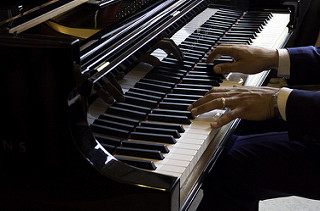 Last time I commented on an experience I’d had at the Charlotte Jazz Festival. (What You Can Leave Out) I observed a pianist doubling on harmonica who on one occasion had considerable difficulty getting the harmonica out of his hand so he could get both hands on the piano part. While extricating himself from the harmonica he did what all good jazz pianists do, played the essential notes with his other hand until both were available. This is not particularly unusual, especially in jazz piano. Nevertheless, he made it work seamlessly for the ensemble and the audience.
Last time I commented on an experience I’d had at the Charlotte Jazz Festival. (What You Can Leave Out) I observed a pianist doubling on harmonica who on one occasion had considerable difficulty getting the harmonica out of his hand so he could get both hands on the piano part. While extricating himself from the harmonica he did what all good jazz pianists do, played the essential notes with his other hand until both were available. This is not particularly unusual, especially in jazz piano. Nevertheless, he made it work seamlessly for the ensemble and the audience.
My point last week was about planning and about understanding the essential work of your organization. This time I’m focusing on my call for arts organizations to become indispensable. From the perspective of individuals who are not true believers in the arts or communities faced with competing needs and interests coupled with limited resources, we cannot afford to be “what can be left out.”
I always acknowledge that the arts are indispensable. However, in practical terms, if that indispensability is not apparent to those for whom it is important for us to be indispensable, we are not, in any way that matters, indispensable.
Now that sentence was intentionally convoluted. Here’s the point: if we have to tell people that we are important, that we are essential, to them–again by any practical measure–we’re really not.
To avoid the fate of dispensability, we must do things that make us matter to people. And to do that we have to know them well enough to know what’s important to them. That comes from relationship building, from engaging with them.
Engage!
Doug
Photo:![]()
![]() Some rights reserved by Bsivad
Some rights reserved by Bsivad
Engaging Matters will be taking the week of July 4 off. Happy Holiday!

Makes me think of a quote that, when I saw it, was attributed to Thomas Beecham, the pharma heir and conductor (though recent Googling hasn’t turned up evidence he said it):
“Music is something that people can get by without, and if it costs too much, they will.”
We have to make it worth what we charge for it.
That is a powerful phrasing of the dilemma we face. I can think of several other examples of how asking the question itself is proof of the correct response or whether it actually counts as a question at all. (if we have to ask whether we are in love we are not, etc…). Which also points to a fundamental difference between what it means to be an insider and an outsider. Part of that difference is that to an outsider the question has the appearance of being empirical, as though it needs evidence to confirm or disconfirm it. The fact of it looking like evidence is required is itself proof of an outsider status. On the other hand to an insider the issue is axiomatic. The arts ARE what matters. It’s not a question of evidence.
This is the impasse. One side thinks there is proof, and the other that proof is a non issue. To even have a conversation we need to bridge a cultural and ideological divide. Facts are what amounts to proof, so I can only think that you are right to suggest that the conversation starts at a deeper level, the level of what things already matter to them, their fundamental values.